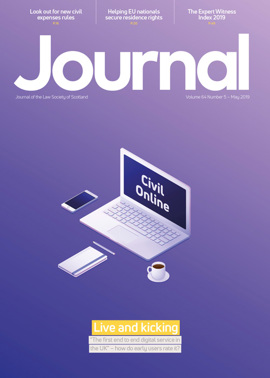Scottish Solicitors' Discipline Tribunal
Patrick Baxter (s 42ZA appeal)
An appeal was made under s 42ZA(9) of the Solicitors (Scotland) Act 1980 by Patrick Joseph Baxter, solicitor, of Matthews Legal Ltd, trading as A B & A Matthews, Newton Stewart against the determination by the Council of the Law Society of Scotland dated 31 July 2018 to uphold a complaint of unsatisfactory professional conduct made against him by Mr and Mrs G (the second respondents, who did not enter the appeal process).
The appellant had acted as executor and solicitor in the sale of a property. The property was marketed and a closing date fixed. An offer was submitted by the second respondents. The appellant issued a qualified acceptance to their agents. During the exchange of missives there was correspondence regarding alterations to the property, building consents and an indemnity policy. A higher offer was received on the same date as the second respondents’ agent confirmed they were in funds. The beneficiaries wished to accept the higher offer. The appellant arranged to pass the case on to another firm. He informed the second respondents’ agent that a higher offer had been received and the beneficiaries wished to accept it. The Professional Conduct Subcommittee considered that the appellant had not followed the guidance on gazumping, gazundering and closing dates and was guilty of unsatisfactory professional conduct.
After considering the appellant’s evidence and submissions by both parties, the Tribunal considered that the subcommittee had erred by misapplying the guidance to the facts. An exception in that guidance applied to the appellant due to the fiduciary duties owed. In any case, he did comply with that guidance. He did not “accept” the instructions. He did not “act” in pursuance of the beneficiaries’ instructions. The call to the second respondents’ agent was not a step in the implementation of instructions. The appellant had instructed another solicitor while continuing to act as executor. Therefore, the Tribunal quashed the determination of the subcommittee. Having done so, it also quashed the censure accompanying the determination and the direction that the appellant pay £1,500 compensation to the second respondents. On joint motion, the Tribunal made no finding of expenses due to or by either party. It directed that publicity should be given to the decision.
Thomas Barclay Duff
A complaint was made by the Council of the Law Society of Scotland against Thomas Barclay Duff, Robert F Duff & Co Ltd, Largs. The Tribunal found the respondent guilty of professional misconduct. He acted dishonestly by taking sums of money from client ledgers in settlement of two contrived fee notes in order to clear credit balances in connection with two executries where work was otherwise complete. No work was done to justify these fees. The fee notes were not rendered outside the firm. Also and in cumulo, the Tribunal found the respondent guilty of professional misconduct in respect of his failure to deal with historic credit balances, his failure to comply with the Money Laundering Regulations, his failure to provide reasonable cooperation with the inspection/investigation procedure, his failure to reply properly to enquiries by the Society, his failure to communicate effectively with a client and his failure to carry out instructions adequately and completely within a reasonable time.
The Tribunal censured the respondent, fined him £2,000 and directed that any practising certificate held or issued to him should be subject to such restriction as will limit him to acting as a qualified assistant to and being supervised by such employers as may be approved by the Council of the Society for an aggregate period of at least five years.
The duty of honesty and integrity is a fundamental and underpinning obligation of the profession. The respondent admitted acting dishonestly by taking to fees two credit balances of £140 and £200. The conduct was not committed for the respondent’s own financial gain. He had exercised very poor judgment by cutting corners to deal with two credit balances. The money was repaid. The respondent had no history of misconduct. The Tribunal considered that the case fell into the category of exceptional circumstances where a strike-off was not necessary. However, censure, fine and restriction were necessary to protect the public and to mark the gravity of the misconduct.
For more visit www.ssdt.org.uk
In this issue
- Claiming under the advance payment scheme
- Time for a written constitution
- New form F9: worth the wait?
- Wedded to a matrimonial property regime
- Brexit divorce set to increase UK's “skype families”
- Corporate personality: Justice v Doctrine
- Reading for pleasure
- The Law Society of Scotland Expert Witness Index 2019
- Opinion: Judith Robertson
- Book reviews
- Profile: Michael Clancy
- President's column
- Is your legal data being held to ransom?
- People on the move
- Sign up – log in – action!
- Frozen out?
- Taxing times for litigators
- DNA analysis: when research just isn’t enough
- Brexit focus: EU citizen settlement remedies
- Why employers should report on wellbeing
- 3% – and then what?
- 1,000 days of mediation
- Barred from acting
- To name or not to name?
- Enter the “What I Think”
- Fixed penalties and fair trials
- Auto-enrolment: keeping employers on their toes
- Scottish Solicitors' Discipline Tribunal
- Vulnerable accused: a need for knowledge
- Burdens and who can enforce them
- Convener’s final bow
- Public policy highlights
- TCSP review update
- Westminster: answering the call
- Accredited paralegal practice area highlight: family law
- Accredited Paralegal Committee profile
- Nyona named star paralegal
- Ask Ash
- Moving nightmares part 2
- Complaints: seeking consistent practice
- Morally bankrupt?
- For the elderly: how SFE works
- Standing up to challenge






